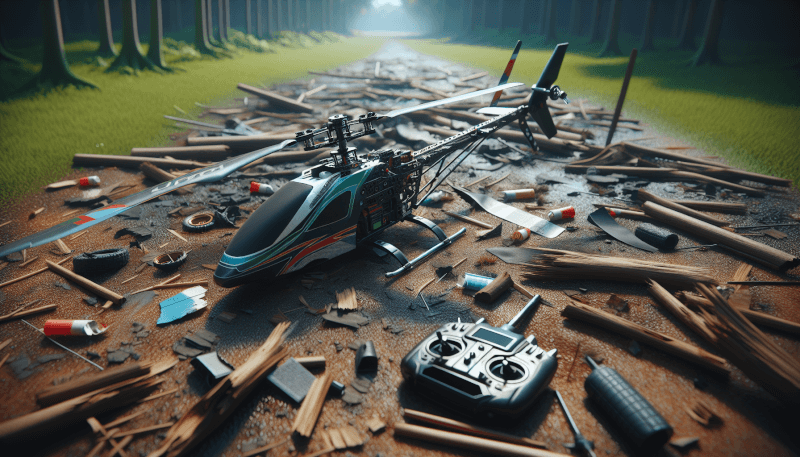Are you an avid remote control helicopter pilot? If so, you may have encountered some common mistakes while flying your RC heli. This article aims to help you avoid those errors and improve your flying skills. Whether it’s losing control, crashing into obstacles, or struggling with maneuvering, we’ve got you covered with some helpful tips and tricks to ensure a seamless and enjoyable RC heli flying experience. So, fasten your seatbelt, buckle up, and get ready to conquer the skies with your RC heli!
Common RC Heli Flying Mistakes and How to Avoid Them

H3 Heading 1: Lack of Patience and Practice
RC helicopter flying can be a challenging endeavor, especially for beginners. One common mistake that many people make is lacking patience and rushing into advanced maneuvers without sufficient practice. It’s essential to start with the basics and gradually progress as you gain confidence and skill.
When starting, take your time to learn the fundamental controls, such as throttle, pitch, roll, and yaw. Practice these basic maneuvers until you feel comfortable and confident in controlling your RC helicopter. By building a strong foundation, you’ll be better prepared to tackle more advanced maneuvers down the line.
H3 Heading 2: Flying in Unfavorable Weather Conditions
Another common mistake that beginners often make is flying their RC helicopters in unfavorable weather conditions. It’s essential to consider the weather before taking your helicopter out for a flight.
Strong winds, rain, or fog can greatly impact the stability and control of your RC helicopter. High winds can make it difficult to maintain stability, while rain or fog can obstruct your view and make it challenging to navigate. Always check the weather forecast before flying your RC helicopter and avoid flying in adverse conditions to prevent accidents or damage to your helicopter.
H3 Heading 3: Neglecting Pre-flight Checks
Before every flight, it’s crucial to perform pre-flight checks on your RC helicopter. Neglecting these checks can lead to unexpected issues or failures mid-flight, putting your helicopter at risk.
Ensure that all the components of your RC helicopter, such as the battery, blades, and motors, are in good condition and securely fastened. Check the transmitter batteries and make sure they are fully charged. Verify that the control surfaces are functioning correctly by performing a range test. Taking a few minutes to conduct pre-flight checks can save you from potential mishaps during the flight.
H3 Heading 4: Overcompensating and Overcorrecting
When flying an RC helicopter, it’s essential to have precise control over its movements. However, many beginners tend to overcompensate or overcorrect, leading to erratic flight behavior and potential crashes.
Avoid excessive use of control inputs and maintain smooth and gradual movements. Be gentle with the controls to achieve smoother and more predictable flight characteristics. This will allow you to maintain better control over your RC helicopter and reduce the risk of making sudden corrections that can destabilize the flight.

H3 Heading 5: Ignoring Battery Safety
Battery safety is a crucial aspect of flying RC helicopters. Ignoring battery safety protocols can lead to accidents, damage to your helicopter, or even injuries.
Always follow the manufacturer’s guidelines for charging and handling the batteries. Use the recommended charger and ensure that the batteries are not overcharged or discharged excessively. If you notice any signs of damage or swelling on the batteries, avoid using them and replace them immediately. Proper battery care and handling are vital for the longevity and safety of your RC helicopter.
H3 Heading 6: Flying Without a Flight Plan
One of the most common mistakes made by beginners and even experienced RC helicopter pilots is flying without a flight plan. Just like piloting a real aircraft, having a flight plan helps you stay organized and focused during your flight.
Before taking off, plan your flight path and the maneuvers you want to execute. This will help you maintain control and navigate your RC helicopter more smoothly. Additionally, having a flight plan allows you to anticipate potential obstacles or hazards, reducing the chances of accidents or collisions.

H3 Heading 7: Neglecting Maintenance and Upkeep
Proper maintenance and upkeep are crucial for the longevity and performance of your RC helicopter. Neglecting these aspects can lead to a decrease in flight performance and potential issues during flights.
Regularly inspect your RC helicopter for any signs of wear and tear. Lubricate moving parts and ensure that all screws and fasteners are secure. Clean your helicopter after each flight to prevent dirt and debris from affecting its performance. By investing time in proper maintenance, you’ll ensure that your RC helicopter remains in optimal condition and continues to provide an enjoyable flying experience.
H3 Heading 8: Flying Beyond Your Skill Level
It’s important to understand and respect your skill level when flying RC helicopters. Trying to perform advanced maneuvers beyond your capabilities can lead to crashes and frustration.
Start with simple maneuvers and gradually progress as you gain experience and confidence. Take your time to master the basics before attempting more complex tricks or aerobatics. By flying within your skill level, you’ll have a more enjoyable flying experience and avoid unnecessary crashes or damage to your RC helicopter.

H3 Heading 9: Ignoring Safety Guidelines
Flying an RC helicopter should always be done with safety in mind. Ignoring safety guidelines can lead to accidents or injuries.
Always fly in designated areas away from people, animals, or property that could be damaged. Respect local regulations and airspace restrictions, especially when flying near airports or in public spaces. Additionally, wearing protective gear such as safety goggles and gloves can prevent potential injuries in case of accidents.
H3 Heading 10: Lack of Proper Training or Instruction
Finally, one of the biggest mistakes that beginners can make is attempting to fly RC helicopters without proper training or instruction. RC helicopters are complex machines, and it’s crucial to learn from experienced pilots or attend training sessions before taking the controls.
Joining a local RC helicopter club or finding an instructor who can guide you through the learning process will greatly benefit your flying skills. They can provide valuable tips, techniques, and safety guidance to ensure that you start off on the right foot.
In conclusion, by avoiding these common RC heli flying mistakes, you’ll enhance your flying experience and minimize the risk of crashes or accidents. Remember to be patient, practice regularly, and prioritize safety guidelines. With time, dedication, and the right approach, you’ll become a skilled RC helicopter pilot and enjoy the excitement that this hobby brings.



